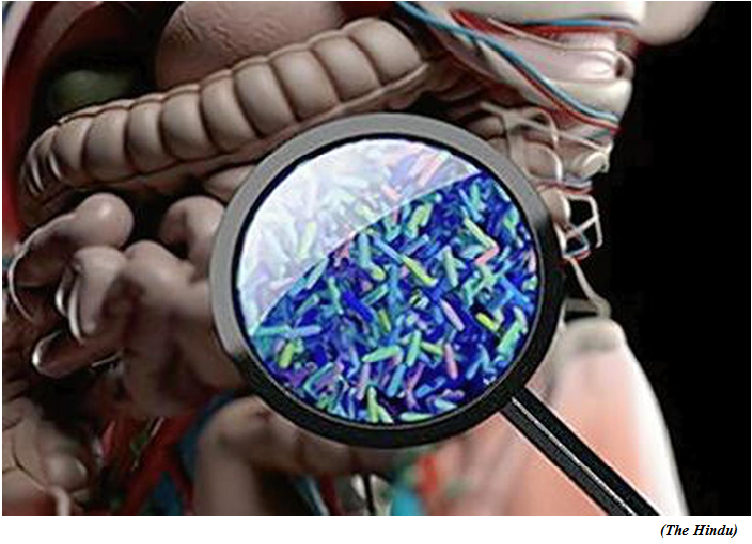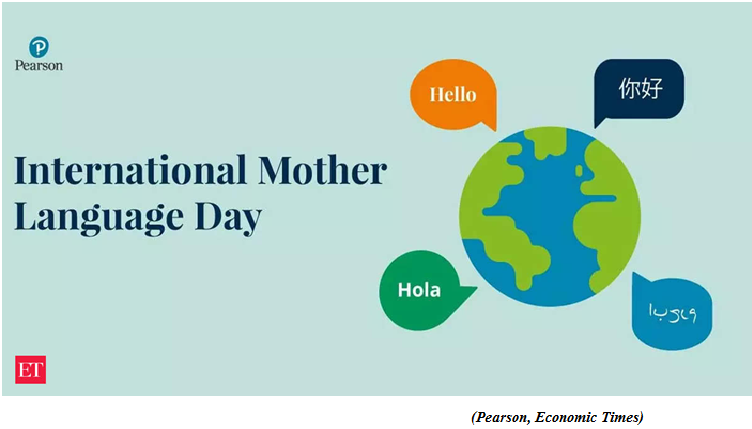The microbiome link to autism disorders (GS Paper 2, Health)

Context:
- A healthy gut microbiome is not a panacea but it may be able to help improve the quality of life of individuals with various diseases that lack other proven interventions.
- Differences in gut microbiome composition have been implicated in several diseases, including Crohn’s disease, celiac disease and particularly, autism.
Autism spectrum disorder (ASD):
- Autism spectrum disorder (ASD) is the term for a group of neurodevelopmental disorders. Researchers are yet to fully understand the aetiology of ASD.
- Aetiology is the study of factors that cause a condition or disease. However, they are beginning to find that a disorder in the gut-brain axis could have a prominent role.
- According to the WHO, ASD affects one in 100 children. Children with ASD have impaired social interactions, lack verbal and nonverbal communication skills, and display restricted and repetitive behaviours. These characteristics can adversely affect one’s cognitive abilities and, over time, diminish one’s quality of life.
Gastrointestinal link:
- A relatively under-researched aspect of ASD is the gastrointestinal problems associated with a subset of children with ASD.
- Limited research findings as well as anecdotal evidence indicate the presence of various gastrointestinal problems, like constipation, diarrhoea, flatulence, and bloating, among others, in children with ASD.
- But even as researchers have proposed several theories to explain the aetiology of ASD, the pathophysiology of the disorder remains largely unknown. At present, there are no known cures and therapeutic interventions available to treat or reverse ASD.
Studying the link:
- The gut microbiome is believed to have a big impact on immune modulation and metabolic activities in the human body. Immune modulation refers, among other things, to the efforts of the immune system to ensure its response is proportionate to a threat.
- Investigations of the dynamic cross-talk between the gut microbiome and the host environment have revealed potential connections to ASD symptoms.
- For example, aberrant antigen trafficking through an impaired intestinal barrier could allow these antigens to eventually pass through the barrier surrounding the brain, triggering a chain of events that worsen ASD symptoms.
- Even if the gut microbiome doesn’t play a causative role, abnormalities in it can challenge a person with toxic metabolites and keep the person from synthesising the metabolites required to produce neurotransmitters involved in cognition, behaviour, mood, and sleep.
- As a result, ‘fixing’ the gut in ASD can reduce the toxic burden and/or help complete the necessary neurotransmitter synthesis pathways.
Key observations:
- They have explored the gut microbiome in children with and without ASD, and have reported several interesting microbial biomarkers in children with ASD.
- They observed dysbiosis in the gut microbiome of children with ASD. They had a higher abundance of lactobacillaceae, bifidobacteriaceae, and veillonellaceae bacteria. The fraction of bacteria of the phylum firmicuteswas found to be significantly higher in the guts of children with ASD.
- They also found an underrepresentation of certain microbes that produce short-chain fatty acids (SCFA), such as faecalibacterium and roseburia, in children with ASD. This supports the hypothesis that a lower level of SCFAs in ASD could lead to an imbalance in brain function and behaviour.
- This is the source of proposals to introduce these strains of bacteria as a probiotic for children with ASD, to help alleviate common gastrointestinal problems and in turn positively influence cognitive and behavioural functions.
What could be done?
- Reinstating a balance in the gut microbiome and reversing gut dysbiosis among children with ASD could alleviate many problems they face and improve their quality of life.
- One promising approach to reverse gut dysbiosis is faecal microbial transplantation (FMT), where stool samples from healthy individuals are transplanted into the large intestines of affected children.
- There is also some evidence that gluten-free and casein-free diets can help children with ASD. This could be because some of these children have been found to lack the bacteria that helps break down casein and gluten into metabolites.
- In all, the role of diet, prebiotics, probiotics, synbiotics (which combine the benefits of probiotics and prebiotics), and FMT for the efficient management of ASD can be said to be encouraging.
International Mother Language Day 2023: Adivasi children in India unable to study in their own tongues needs redressal
(GS Paper1, Culture)
Why in news?
- As the world celebrates International Mother Language Day February 21, 2023, the situation in India in this regard is grim.

About International Mother Language:
- Every year, International Mother Language Day is observed on February 21 to highlight the cultural and linguistic diversity in the country. UNESCO recognised the importance of this day at the General Assembly in 1999.
- Bangladesh is the first country to initiate the celebration of International Mother Language Day, which was accepted at the 1999 UNESCO General Conference.
- The theme of International Mother Language Day 2023 is ‘multilingual education - a necessity to transform education’.
Challenges in India:
- One of the most linguistically diverse areas of the planet, India nevertheless is losing many of its tongues fast owing to the forces of modernisation and globalisation. One of the main drivers of language death in the country is lack of education in them.
Example of Odisha:
- Odisha has 62 tribal groups including 13 Particularly Vulnerable Tribal Groups.
- When tribal children go to primary school, they find most of the teachers do not belong to that particular district or locality.
- The teachers expect the children to speak the Odia language. The tribal students, who are not that familiar with Odia, make an effort but it does not come out well.
- The irony is that of the 62 tribal groups in the state, including 13 particularly vulnerable ones, literature and education material is available only in Santhali and Ho.
Global issue:
- While mother-tongue-based education is essential to the full development of individuals and to the transmission of linguistic heritage, 40 per cent of the world’s students do not have access to education in the language they speak or understand best.
- Each of the more than 7,000 languages spoken by humanity carries within it a unique view of the world, of things and of beings, a way of thinking and feeling, so much so that each disappearance of a language constitutes an irretrievable loss.
- The United Nations agency initiated the International Decade of Indigenous Languages (2022-2032) in a bid to mobilise the international community for safeguarding a major part of the world’s cultural diversity.
Way Forward:
- The National Education Policy 2020 advocates mother tongue-based education from the early stage to higher education.
- The question of linguistic justice should be addressed immediately.
APJ Abdul Kalam Satellite Launch Vehicle Mission2023
(GS Paper 3, Science and Tech)
Why in news?
- Recently, a total of 150 satellites made by school students from different states were launched on a rocket as part of APJ Abdul Kalam Satellite Launch Vehicle Mission2023.
- The Martin Foundation in association with Dr APJ Abdul Kalam International Foundation and Space Zone India launched the misson.
- The rocket was launched from Pattipolam village, Chengalpattu district, Tamil Nadu.

Dr APJ Abdul Kalam International Foundation:
- Dr APJ Abdul Kalam International Foundation was established by the Family of Dr. Kalam in 2015 to fulfill his dreams for transforming India.
Key Highlights:
- Through this initiative, more than 5000 students from Grades VI to XII from different parts of the country, have been enabled to design and develop 150 PICO satellites, which are to be launched through the rocket.
- This mission has also provided an opportunity for selected students to learn more about Science, Technology, Engineering, and Mathematics.
- The selected students have been taught about satellite technology through virtual classes, which have been followed by hands-on sessions to help them explore the project domain. They have also been made aware of the numerous benefits available in this sector.
Significance:
- A total of 2000 students from more than 100 government schools are a part of this rocket project.
- This will be a good platform for government school students to get trained in space sciences and provide them with a platform to explore a career in that domain.




